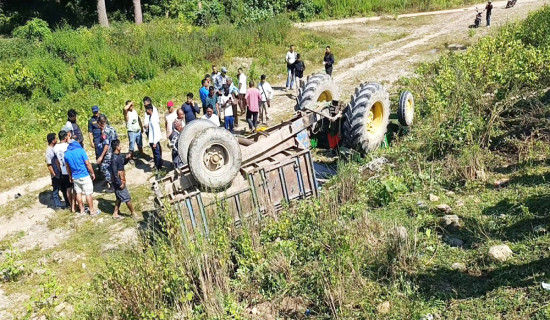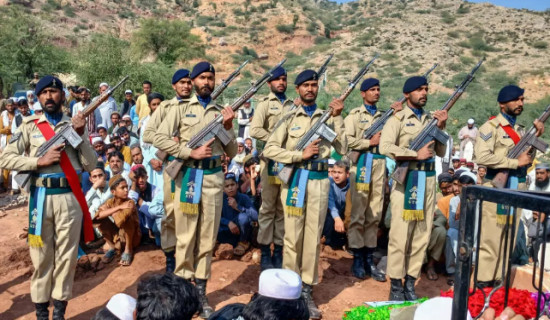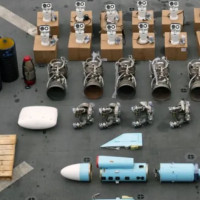- Sunday, 19 October 2025
Powerful quake in Turkey, Syria: Toll crosses 2,300
Azmarin, Syria, Feb. 7: A powerful 7.8 magnitude earthquake rocked wide swaths of Turkey and Syria early Monday, toppling hundreds of buildings and killing more than 2,300 people.
Hundreds were still believed to be trapped under rubble, and the toll was expected to rise as rescue workers searched mounds of wreckage in cities and towns across the area.
On both sides of the border, residents jolted out of sleep by the pre-dawn quake rushed outside on a cold, rainy and snowy night. Buildings were reduced to piles of pancaked floors, and major aftershocks or new quakes, including one nearly as strong as the first, continued to rattle the region.
Rescue workers and residents in multiple cities searched for survivors, working through tangles of metal and concrete. A hospital in Turkey collapsed, and patients, including newborns, were evacuated from facilities in Syria.
In the Turkish city of Adana, one resident said three buildings near his home were toppled. “I don’t have the strength anymore,” one survivor could be heard calling out from beneath the rubble as rescue workers tried to reach him, said the resident, journalism student Muhammet Fatih Yavuz.
“Because the debris removal efforts are continuing in many buildings in the earthquake zone, we do not know how high the number of dead and injured will rise,” Turkish President Recep Tayyip Erdogan said. “Hopefully, we will leave these disastrous days behind us in unity and solidarity as a country and a nation.”
The quake, which was centered on Turkey’s southeastern province of Kahramanmaras, was felt as far away as Cairo. It sent residents of Damascus rushing into the street, and jolted awake people in their beds in Beirut.
It struck a region that has been shaped on both sides of the border by more than a decade of civil war in Syria. On the Syrian side, the swath affected is divided between government-held territory and the country’s last opposition-held enclave, which is surrounded by Russian-backed government forces. Turkey, meanwhile, is home to millions of refugees from that conflict.
The opposition-held regions in Syria are packed with some 4 million people displaced from other parts of the country by the fighting. Many of them live in buildings that are already wrecked from past bombardments. Hundreds of families remained trapped in rubble, the opposition emergency organization, called the White Helmets, said in a statement.
Strained health facilities and hospitals were quickly filled with injured, rescue workers said. Others had to be emptied, including a maternity hospital, according to the SAMS medical organization.
The region sits on top of major fault lines and is frequently shaken by earthquakes. Some 18,000 were killed in a similarly powerful earthquakes that hit northwest Turkey in 1999.
The U.S. Geological Survey measured Monday’s quake at 7.8. Hours later, a 7.5 magnitude one struck more than 100 kilometers (60 miles) away. An official from Turkey’s disaster management agency said it was a new earthquake, not an aftershock, though its effects were not immediately clear. Hundreds of aftershocks were expected after the two temblors, Orhan Tatar told reporters.
Thousands of buildings were reported collapsed in a wide area extending from Syria’s cities of Aleppo and Hama to Turkey’s Diyarbakir, more than 330 kilometers (200 miles) to the northeast. A hospital collapsed in the Mediterranean coastal city of Iskenderun, but casualties were not immediately known, Turkey’s vice president, Fuat Oktay, said.
Televisions stations in Turkey aired screens split into four or five, showing live coverage from rescue efforts in the worst-hit provinces. In the city of Kahramanmaras, rescuers pulled two children alive from the rubble, and one could be seen lying on a stretcher on the snowy ground. (AP)

















